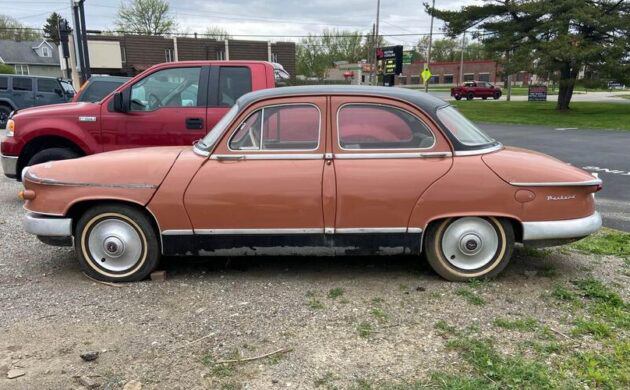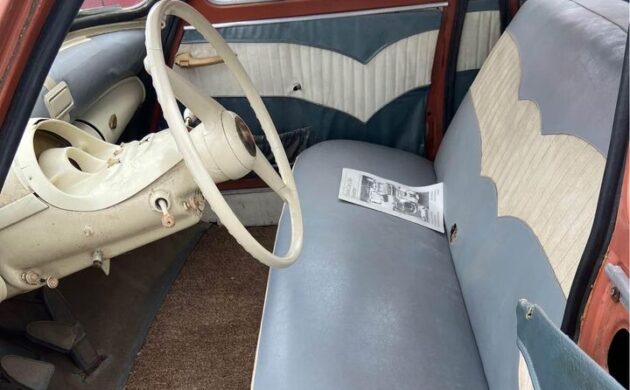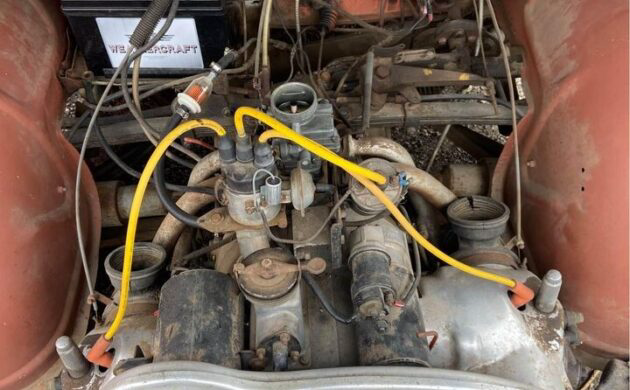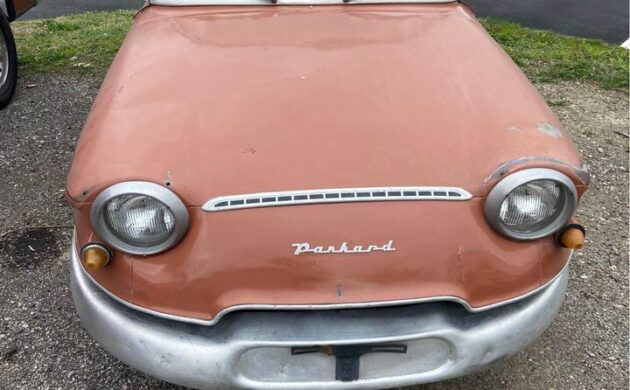Price-Dropped French Classic: 1963 Panhard PL17
Manufacturers need to look outside the square if they plan to produce a car with limited engine power. Such was the case with Panhard and its PL17 model. Its engine bay housed a tiny motor with modest power, but some radical thinking resulted in a car that could seat six but could cruise comfortably on the open road. This 1963 example has sat for years but is a solid classic requiring a new home. The seller has listed it here on Facebook in Springfield, Illinois. They originally listed it for $16,500 but have recently slashed it to $12,500.
Locating a color chart for a Panhard PL17 is challenging, so I cannot provide specific information on the primary shade gracing this car’s panels. It isn’t perfect, sporting a collection of marks and dings that will prompt the new owner to perform a cosmetic refresh. The lower extremities don’t exhibit signs of significant rust, but it would be worth performing an in-person inspection to confirm the floors are clean and that the vehicle is structurally sound. These classics aren’t growing on trees, so locating replacement trim can be challenging. Therefore, parts that don’t pass muster are destined for a trip to the platers. The glass is in good order, as are the distinctive wheel covers.
This Panhard’s interior isn’t perfect, but it isn’t as shredded as many we’ve seen at Barn Finds. There is a visible hole in the front seat and a couple of missing handles, but the seat could be repaired. Locating handles could be more difficult, but it would be worth being patient because you would almost certainly strike gold. Otherwise, adapting something different could be an option. The broad bench seats allow the car to carry six occupants, although they couldn’t all be full-size adults. However, a family with young children would find life inside this PL17 surprisingly comfortable.
The secret of the PL17’s success rests in several key factors. Its engine bay houses a tiny 848cc air-cooled twin, and while that doesn’t sound exciting, it can produce 50hp and 51 ft/lbs of torque. The ponies reach the front wheels via a four-speed manual transmission, allowing the 1,852 lb Panhard to cover the ¼-mile in 22.2 seconds. However, that is only part of the story. The company focused strongly on aerodynamic efficiency, producing unique and distinctive styling. It might not be a jet on the strip, but a healthy PL17 will cruise all day at 60mph. This car is complete and ran when parked (grit teeth!). That was around six years ago, meaning it requires a thorough inspection and possible maintenance before the buyer hits the key.
This is not the first Panhard PL17 we’ve featured on Barn Finds, but they aren’t a car that we see every day. They are a surprise packet and would be a practical option for an enthusiast with a young family. It is unlikely to ever become a mega-bucks vehicle, but there’s little chance the new owner will find themselves parked beside an identical example at a Cars & Coffee. Standing out from the crowd is rarely bad and is the opportunity awaiting someone with this Panhard. Are you enough of an individual to accept the challenge of parking this gem in your workshop and returning it to its former glory? I wish you luck if you do, and I can’t wait to see the finished product.
Auctions Ending Soon
 1965 Ford Falcon Station WagonBid Now2 days$2,300
1965 Ford Falcon Station WagonBid Now2 days$2,300
 2002 Jaguar XK8 ConvertibleBid Now3 days$4,250
2002 Jaguar XK8 ConvertibleBid Now3 days$4,250
 1979 Chevrolet Camaro Z/28Bid Now4 days$4,500
1979 Chevrolet Camaro Z/28Bid Now4 days$4,500
 1960 Dodge D300Bid Now4 days$300
1960 Dodge D300Bid Now4 days$300
 2006 Ford Mustang Saleen S281 SCBid Now6 days$100
2006 Ford Mustang Saleen S281 SCBid Now6 days$100






Comments
Like many French cars of that era the Panhard leads the pack with its most unusual styling. Styling that makes the Citroen DS seem normal. Car is actually quite brilliant and organic and has a little Hemi engine that can! Everything about this car is efficient. I don’t know resale values for these but it looks like a fair deal for the current asking price if closer inspection reveals a solid chassis. I would think if you own a DS you would need one in your garage as your town car.
I loved mine (a 1961 Tigre, PL17) perfect companion to my 1964 2CV Citroen…sadly they are but distant memories now!
Of course my dream car (DS-19 Citroen) never happened,
I’m relegated to a Ford Fiesta with the complicated jerk-o-matic 6 speed transmission.
Ask Dave on Restoration Garage about Panhards. He had bought a 52 Dyna Brake Wagon in an episode.
From the era when it was axiomatic in the auto industry that “the French don’t copy anyone and nobody copies the French.”
…Oooooo….!
Torsion bar valve springs too, if I remember right.
Panhard designer #1: “Those Citroens sure look weird!
Panhard designer #2: “Hold my Sauvignon Blanc…”
Can’t tell if it’s coming or going. And some have the audacity to say AMC produced some far out designs. If THIS is what the designers settled on, like AMC, imagine what didn’t make the cut. Allegedly by sane, sober people, not “on” anything, and not much different than some of the custom creations we’ve seen here, where builders are accused of such atrocities. The big difference, is these were actually mass produced, meaning, many actually liked the styling and bought them. Again, with all these, um, oddballs, it sends a clear message what kind of person you are, and you better like talking to people with this one.
Okay now, let’s see what this baby can do, an interested buyer may say. This car wouldn’t “cruise all day at 60” with a 50 mph tail wind down Monteagle Hill. In fact, it’s motor may actually hinder any speed. I suppose different driving, but I always wondered what would happen if you put a European used to these, in a R code Ford of same vintage?
you want aerodynamics…try this Panhard (1964)
https://www.youtube.com/watch?v=CymtD3hlMPM
Loved the Matra’s screaming down the back straight at Sebring.
Not old enough to have seen the Bugatti’s efforts….
In case anyone doubts the design of French cars…ck out Delahaye, Lago Talbot
PS my Panhard ran 3000 rpm at 60 MPH in 3rd gear….seldomly used 4th gear.
Top speeds of 130 kilometres per hour (81 mph) for standard sedans and 145 kilometres per hour (90 mph) for the Tigre, according to the road tests of the day. Looks like these little toys could scoot!
My Tigre was exactly twice thee Cubic Centimeters as my Citroen 2 CV
850 CC versus 425 CC, but what difference in performance!
How the hell do you know, Howard? Have you owned one? Have you driven one? If not, please keep your uneducated remarks to yourself, please.
Another strange-looking French car. You gotta hand it to the French, they came up with some weird-looking automobiles.
Oddities for sure Steve….long before there was any realization of absorbing the energy in bumper design….Panhard’s answer was rather malleable aluminum bumpers…softening the transmission of collision force to the passengers…mine was a 1961 Tigre, PL 17,
This is textbook auto ugly.
Aerodynamics ahead of it’s time is probably ugly! LOL
I wonder what the compression ratio is in that engine, that’s a remarkable hp rating for that size of an air cooled engine. I’m thinking over heating problems?
I owned the Air Cooled Panhard in Florida, never any overheating problems.
Years ago the epitome for engines was 1 HP per cubic inch….that is what the Panhard put out on regular gasoline. Remarkable for it’s day. Easy reving with roller bearing crankshaft. A 2 cylinder bomb.
I’ve seen them run at the 12 hours of Sebring…strong!
Jules what was the compression ratio of those engines? My sorrowful experience with vintage VWs is that if you exceed 7.5to 1 you overheat.
https://www.youtube.com/watch?v=CymtD3hlMPM
the engine in the most aerodynamically car ever built (Panhard) , put out over 70 hp with over 220 KPH
602cc Citroen 2CVs are 8.5:1 and Dyanes 9:1, so I’d guess that the Panhards are thereabouts too. VWs don’t have hemispherical combustion chambers, do they? That might be a contributory reason.
You can sit a Citroen at 6000rpm all day; I once built an engine that was still making power at 7200. Not recommended…
My Tigre PL17 was made in 1961…it had 7.2 to one Compression Ratio
I recall aero dynamic course in college When two ice cream cones put together was the best design for aero efficiency. Did the French experiment with this car.
The question of the day – Did the French ever make a decent car besides a F1 race car? Renault back in the 80’s or Turbo Era was the first engine manufacturer to use a pneumatic valve train on their F1 race car for higher and faster revs.
I am far from a fan of French anything, but their food and the Panhard was a gas. As far as the French ever building a good car, they absolutely did from extremely elegant Delahayes, the Delage which was driven by the King of Siam to rock solid Hotchkiss. Mr. Panhard was an automotive revolutionary and wouldn´t bend to the taste of the public, ergo his enterprise was swallowed by Citroen. A buddy of mine way back in the day had a 2 seater Panhard with the pancake engine when we were stationed in Würtzburg. He absolutely loved it and after he let me drive it, I was sold. As far as the styling goes, I fail to see anything ugly, unusual yes, but ugly? No
Do do check out the Matras…real screamers ! Hope everyone is aware of the French Bugattis and more current Citroen rally cars.
Not sure about compression ratio on the PL 17 Tigre…but I believe it was about 7.2 to one. Of course the temperature in the heads was somewhat better than other air cooled cars (VW/ Corvair/) due to the hemispherical combustion chamber design. I owned my Tigre in S. W. Florida, never had any problems with overheating!
https://oldmotors.net/panhard-pl-17-the-two-cylinder-tiger/
This is a car that I have never owned (or even sat in) but I do have that Panhard badge at my garage workbench. And at one point I was part owner of what had been a very pretty DB Panhard race car. It was engineless and had a wrinkled body but it was alluring to sit in and dream about getting it restored. My buddy passed away early and I never tried to retrieve my share of that car. I just hope it wasn’t scrapped after his barns had been cleared.
My father in law and his dad were Panhard owners and after Sr had passed away I found a box of Panhard parts in the attic. I donated all of it to a PL17 owner except for the badge that I kept as a memory. The story my father in law was telling was that the tiny gearbox was what was prone to overheating when driving fast with a loaded car. For some vacation trips he said he put towels around the gearbox and rigged the windshield washer to rather spray those towels with water to keep the gearbox cool.
Great story Beyfon….love the lore! The Tigre that I owned came wth a can of Molly Slip oil additive that the previous owner had been using solely for the transmission. I have seen tranny coolers added to the Dynas. Another tip learned was to not use multi viscosity motor oils. Mine was on a diet of 50 weight Castrol.
Thank you for a very interesting story!
A thought on Panhard aerodynamics…this was done in 1964 for LeMans,,,judged as the most aerodynamic car. enjoy:
https://youtu.be/CymtD3hlMPM
” I cannot provide specific information on the primary shade gracing this car’s panels.” Sounds like a real estate agents listing , instead of ” I’m not sure what color this car is” lol
I have seen that colour (exact) on other offerings! Might be an original factory paint!
Adam, quoting 1/4 mile stats on a ’63 Panhard is mindlessly useless. It’s dumb. It’s superfluous; it’s annoying to read; it has no value in assessing the vehicle. Nobody is ever going to drag a ’63 Panhard. Can you stop quoting that stat on anything but a muscle car? Honestly.
I encourage any reader (I guess all BF readers are “gear heads”) to look up the great variety of cars (even tanks) manufactured by Panhard since 1887 when it was the very first “only cars” manufacturer under the name Panhard and Levassor; it is actually debatable whether it was the first “automobile”, ahead of Benz. The name Panhard is still heard today, part of the rear suspension of many cars. That famous 850cc air cooled engine had its weaknesses, true, but it was nevertheless a great engine, a mighty one at that.
The flat twin Panhard engines, with rollerbearings on conrods and mains, were designed in ’47 to do 7000 rpm, and they would do that. The engines tended to get a bad rep ONLY because those were the days of LEADED GAS, and the sludge I’ve dug out of late ’50s and early ’60s Citroen DS engines is awful stuff – grey sludge like ground LEAD, sticky and packed solid in the centrifugal sludge traps designed into the Citroen DS engine cranks. When the sludge piled up and shut off oil flow, the engine bearings were done. Same thing happened even worse with the Panhard engines as, being all rollerbearings, there is no way to get oil pressure to the conrods or mains except splash or squirt lubrication.. The Panhard cranks had centrifugal catchrings on each crankshaft end. The cam was a squirtgun, shooting oil when in a certain orientation to the crank ends, into the catchrings, which in turn centrifuged the oil into the conrod bearings. I have a crank with those oil rings full of leaded sludge, which filled the rings, prevented any oil getting to the bearings, and they’d burn up at around 30-32K miles, according to a French friend who grew up in France during WWII. He’d get 100mph out of his Panhard, and my ’59 Panhard Dyna Z16, last of the jellybean styling, was clocked at 85 on I-23 in Mich after the Orphan car show in 2004 by a Chrysler friend behind me, and I wasn’t flat out. My ’61 PL17 Panhard convertible easily cruises at 80 on 101 and 880 around the SF bay. It’ll top out at 90. Who needs a V8??
Love the story you unfold Ken….my 61 Tigre was a bomb….never used 4th gear in most of my driving in South Florida! Only used 50 W Castrol in the PL17….and AMOCO white gasoline!
My 64 2-CV was another remarkable car doing 80K on the original Mich X steel belted radials
Even lower price today, July 2 2023: $6500
Wow, i would snatch this one if it were not for living with a one car
Garage and an ever decreasing income!
Great value!